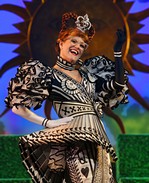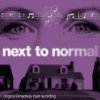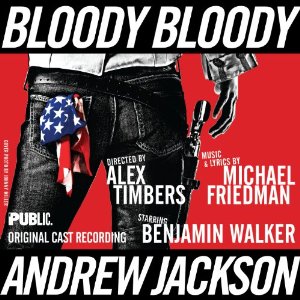SITE GUIDE
SEARCH
REVIEWS
REVIEW ARCHIVES
ADVERTISING AT CURTAINUP
FEATURES
NEWS
Etcetera and
Short Term Listings
LISTINGS
Broadway
Off-Broadway
NYC Restaurants
BOOKS and CDs
OTHER PLACES
Berkshires
London
California
New Jersey
DC
Connecticut
Philadelphia
Elsewhere
QUOTES
TKTS
PLAYWRIGHTS' ALBUMS
LETTERS TO EDITOR
FILM
LINKS
MISCELLANEOUS
Free Updates
Masthead
A CurtainUp Review
Wonderland
|
Welcome to wonderland This is your new address You'll love it more or less No time to decompress It's afternoon all day There's lots of games to play Flamingo lawn croquet So please enjoy your stay! —(sung by The Wonderlanders to Alice) |

Karen Mason
(Photo: Michal Daniels) |
Chloe's mother Alice (Janet Dacal), a writer of children's books, arrives home after work and is discouraged when she opens a letter from her publisher stating that her most recent manuscript has been rejected. "It's the Worst Day of My Life" Alice and Chloe jointly commiserate.
To make matters worse, Alice has a headache, the result of hitting her head on a light fixture riding up in the lurching service elevator. Left to rest alone, Alice is startled when The White Rabbit suddenly darts into the room but just as quickly departs. If her headache was about to miraculously disappear, mine was about to begin.
Without having any factual figures, I suspect that there may be almost as many either reverential, audacious and even perverse variations (film and stage) on the Lewis Carroll classic Alice's Adventures in Wonderland as there are of Mary Shelley's Frankenstein and Bram Stoker's Dracula. On the surface, there is no good reason to object to the approach that composer Frank Wildhorn and his collaborators Frank Murphy (book and lyrics) and George Gregory (book and lyrics) have taken to give a contemporary resonance to Carroll's absurdist Victorian fantasy. But for the deafening assault on our ears, the result of a sound system that takes no prisoners, there are elements that do work in this occasionally sufferable musical.
Wildhorn has previously demonstrated his flair for dispensing melodic content into such classic literary texts as Jekyll & Hyde, The Scarlet Pimpernel, even Dracula, The Musical. His score for Wonderland certainly has its quotient of tolerable tunes, mainly the ballads. It's a shame that neither Boyd and Murphy's relentlessly in-jokey book nor Boyd's pedestrian direction measure up to the show's stunning visual accessories.
A lot of consideration has obviously been given to this musical's often off-the-wall displays of eye-candy: Susan Hilferty's fantastical costumes (especially for The Queen of Hearts) and the plethora of flashy splashy high tech video projections (the work of Sven Ortel.) Set designer Neil Patel keeps a countless number of colorful set pieces sliding and gliding, expanding and contracting within a silvery Victorian frame, all of which is beautifully embraced by the often dazzling lighting of designer Paul Gallo.
Whatever lurks behind our evidently eternal fascination with the adventurous and certainly curious Alice, it isn't too much a shock to find her as an adult in New York. As portrayed with a beguiling vitality by Dacal, this Alice is rightly concerned about her career as a writer, a marriage on the skids and a neglected daughter. This is as good as reason as any for her to follow a white rabbit down a hole, only in this instance it's that darn service elevator. And what a long and wild ride it proves to be.
In deference for those who may be hesitant about taking a different route to Wonderland, some of the original Alice drawings by John Tenniel are projected on the scrim before the show begins and again before Act II. These delightful images have been subtly animated. As they are also accompanied by quotes from the original book, these were for this viewer the most charming part of the show.
Alice's destination is meant to be giddily disorienting as she encounters a host of nutty, some even odious, characters in her quest for an explanation and an escape route. The catch is that in contriving a modern twist for the familiar story, director Gregory Boyd and lyricist Jack Murphy have only fitfully succeeded in making the journey amusing. It's certainly never whimsical. To be fair, you could credit them with actually attempting to make more sense of the original, a dubious goal.
What makes Dacal particularly winning is that she is far removed from the classic image of Alice. This heroine is a curly-haired redhead who gets opportunities to belt out some deafening high notes in the current tradition that equates louder with better. She also dances up a storm in numbers choreographed without much imagination by Marguerite Derricks. You will have to wait until Act II to hear Dacal sing "Once More I Can See," one of those powerhouse, I-can-sing-any-note-higher-louder-longer-than- you-thought-humanly-possible ballads for which Wildhorn and his ilk in contemporary musical theater are most notable.
There is ' a bit of sweetly contrived cleverness (call it an escape clause) that has Alice meet a reflective Lewis Carroll (Darren Ritchie) in Act II, in which she has the opportunity to see herself as a child again (the particularly disarming Sonenclar.) It is a lovely touch, as is the song they share "I Am My Own Invention." Sonenclar is a terrific young performer who shows up again in Act II when Chloe is coerced by The Mad Hatter to enter Wonderland.
Alice, however, has her first madcap encounter in Wonderland with a Latino Cheshire Cat El Gato (Jose Llana) who wastes no time inviting her to join him in a spirited salsa ("Go With the Flow".) It's a shame that Llana and E. Clayton Cornelious, who plays the squirmy-jazzy Caterpillar, accompanied by a bevy of "legs" work hard to amuse, but aren't helped by their so-so material.
Edward Staudenmayer is presumably not meant to be funny — and isn't — as the discombobulated White Rabbit. Karen Mason, however, makes a fine impression and a splendid transformation from mother-in-law to Wonderland's execution-obsessed Queen of Hearts who, with three back-up singers, gives the show a touch of old styled vaudeville with a diverting "Off With Their Heads." Kate Shindle is much too bland and posy as Alice's nemesis the villainous Mad Hatter who plans to usurp the Queen of Heart's throne.
It certainly makes sense that the reasonably dashing and personable Darren Ritchie who plays Jack The White Knight is ready and eager to rescue this damsel in distress. Dressed, as are his pals, for a game of polo (eh, what?) Jack also gets the show's biggest laugh and sustained applause when he answers Alice's query about those Wonderlanders, Danny Stiles as Morris the March Hare, who aquabbling at an important gathering that afternoon. =="It's mostly an angry, mean-spirited bunch of bullies who want to do away with everyone and everything, but don't have a clue what they'd put in its place. It's called The Tea Party."
Ritchie sings a disarming ballad, almost a spoof, "One Knight." It makes sense that he will reappear late in the show as Alice's husband returning to his family. Dacal and the entire company express a kind of shared relief in "Finding Wonderland." with these apt lyrics: "It's not too late. Here in my prime, Hearts can unbreak, In the story's nick of time — A happy ending," A perfect rhyme? Hardly, but what can you expect after a nasty bump on the head?
|
Wonderland Book by Gregory Boyd & Jack Murphy Lyrics by Jack Murphy Music by Frank Wildhorn Directed by Gregory Boyd Cast: Karen Mason (Edwina, The Queen of Hearts), Carly Rose Sonenclar (Chloe), Janet Dacal (Alice), Edward Staudenmayer (The White Rabbit), E. Clayton Cornelious (Caterpillar), Jose Llana (El Gato), Darren Ritchie (The White Night, The Victorian Gentleman), Danny Stiles (Morris, The March Hare, Kate Shindle (The Mad Hatter). Set Design: Neil Patel Costume Design: Susan Hilferty Lighting Design: Paul Gallo Video & Projection Design: Sven Ortel Sound Design: Peter Hylenski Hair & Wig Design: Tom Watson Musical Supervision & Orchestrations: Kim Scharnberg Choreography: Marguerite Derricks Running Time: 2 hours 15 minutes including intermission Marquis Theatre, 1535 Broadway at 46th Street 877-250-2929 Tickets ($49.00 - $132.00) Performances: Tuesday at 7pm, Wednesday through Saturday at 8pm, matinees Wednesday and Saturday at 2pm and Sunday at 3pm. Previews began 03/21/11 Opened 04/17/11 Review by Simon Saltzman based on performance 04/14/11 |
|
Musical Numbers
| |
Act One
|
Act Two
|
|
REVIEW FEEDBACK Highlight one of the responses below and click "copy" or"CTRL+C"
Paste the highlighted text into the subject line (CTRL+ V): Feel free to add detailed comments in the body of the email. . .also the names and emails of any friends to whom you'd like us to forward a copy of this review. Visit Curtainup's Blog Annex For a feed to reviews and features as they are posted add http://curtainupnewlinks.blogspot.com to your reader Curtainup at Facebook . . . Curtainup at Twitter Subscribe to our FREE email updates: E-mail: esommer@curtainup.comesommer@curtainup.com put SUBSCRIBE CURTAINUP EMAIL UPDATE in the subject line and your full name and email address in the body of the message. If you can spare a minute, tell us how you came to CurtainUp and from what part of the country. |

Slings & Arrows-the complete set
You don't have to be a Shakespeare aficionado to love all 21 episodes of this hilarious and moving Canadian TV series about a fictional Shakespeare Company






